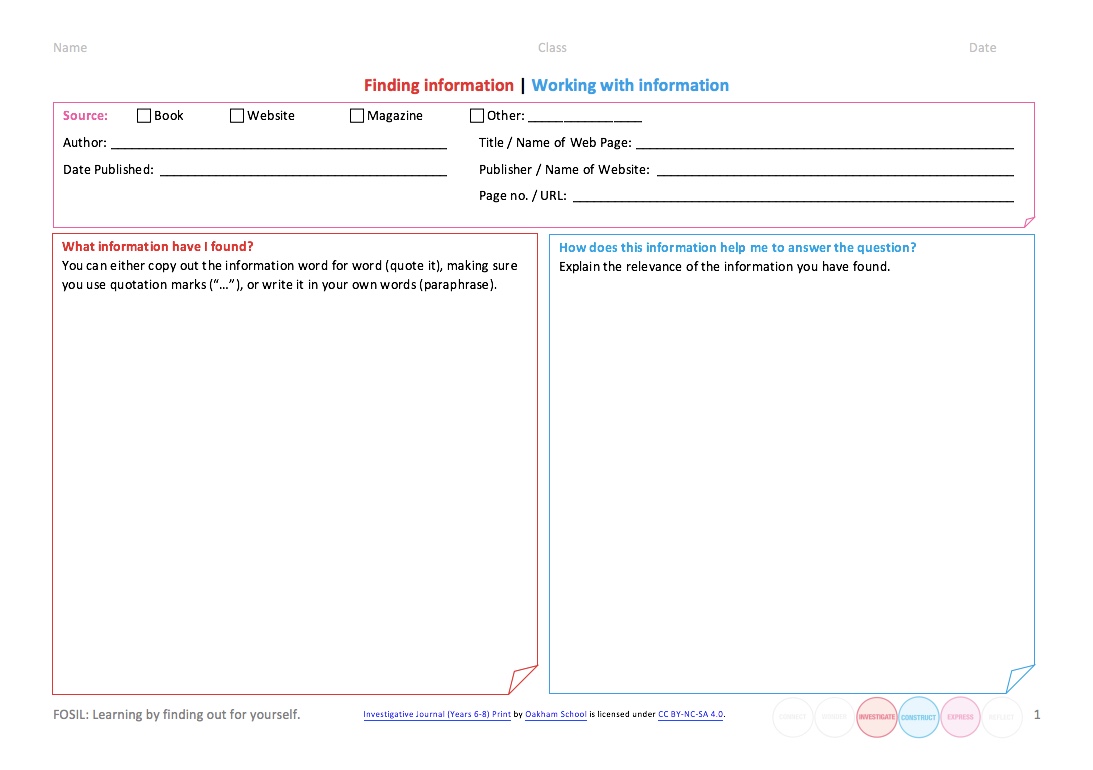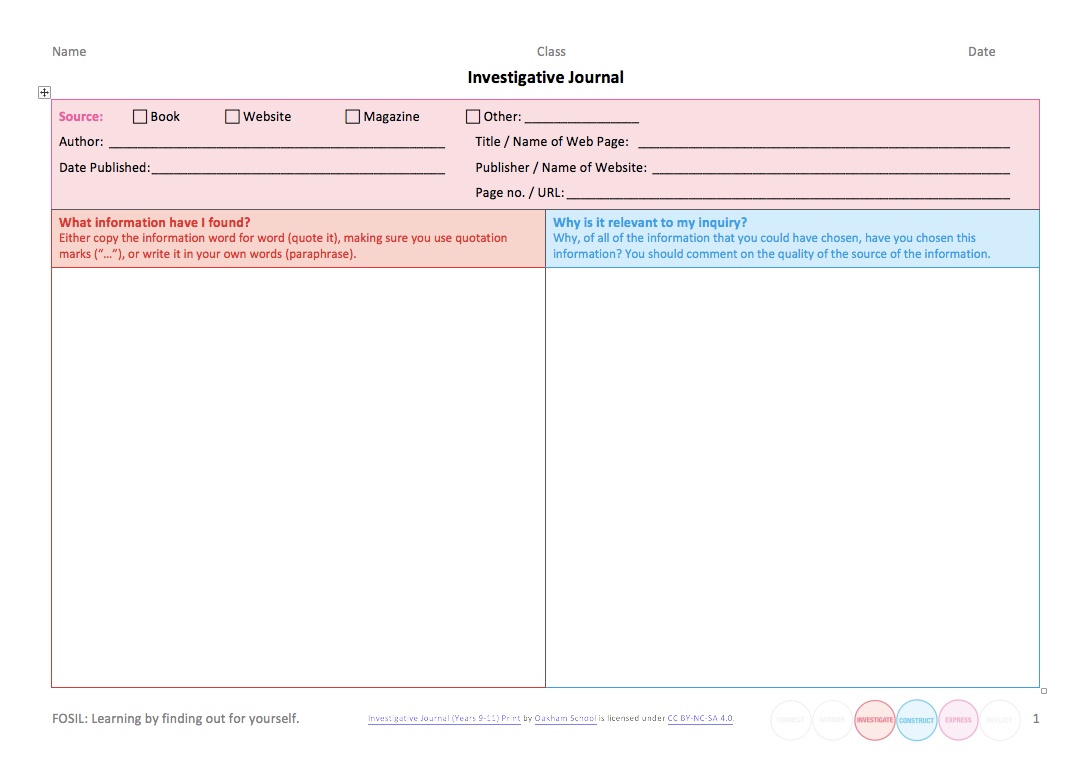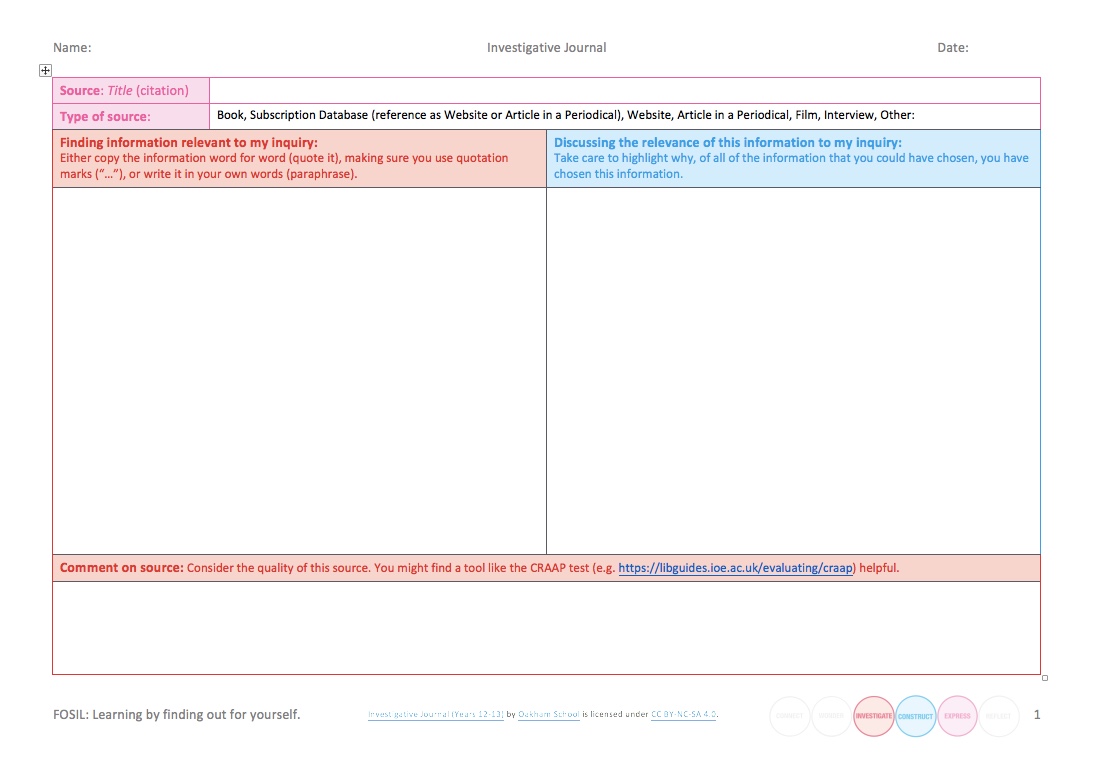Reply To: Academic Honesty and FOSIL
Home › Forums › Skills, skills frameworks and stages in the FOSIL Cycle › Academic Honesty and FOSIL › Reply To: Academic Honesty and FOSIL
Thanks for this excellent and important question, Ruth.
Citing and referencing is explicitly part of the Express stage, which is consistent with other models of the inquiry process and information literacy definitions; i.e., it is when sharing what I have found that acknowledging my intellectual and informational debt to others is formally required. In fact, our journey to FOSIL started with a search for a framework of information literacy skills that would help us to actually prepare our students for the IB DP EE requirements for students to cite and reference according to a recognised academic style. The Empire State Information Fluency Continuum, which fortuitously turned out to be a framework of inquiry skills and accompanying model of the inquiry process, locates citing and referencing at the following points in the framework:
- Year 11: “Cites all sources used according to standard style formats”. We chose APA for the EE for a number of reasons.
- Year 8: “Cites all sources used according to local style formats”. We chose APA as our house style for the same reasons and for consistency.
- Year: 6: “Cites all sources used according to model provided by teacher” (includes librarian). As above.
However, because the Empire State Information Fluency Continuum, which FOSIL grew out of, is aimed at “building understanding and creating new knowledge through inquiry”, there is a concern with sources that runs through the entire Cycle:
- Connect: What do I already know, which may require some investigation, and how certain am I of this knowledge?
- Wonder: What don’t I know and/or what am I not certain of, and where might I find this out?
- Investigate: We tried to make the concern with sources explicit in the description of this stage – “Knowing what scholarly resources are available and being able to use them effectively”.
- Construct: While all of the stages are important, this stage is crucial as it shifts the emphasis from finding information to thinking with the information. Interestingly, because the emphasis is on what students think about the information that they have found in response to their informational need, so theirconcern with the intelligibility and reliability of their sources is slowly growing, and so is their desire to point his out. This is addressing academic honesty in a proactive and positive way. Also, we tried to make the concern with sources explicit in the description of this stage – “Building an accurate understanding based on factual evidence”.
- Express. This is where citing and referencing is explicitly located. It is worth pointing out here that when we first started, most colleagues viewed citing and referencing as a technical skill, and there is a technical element to it, but it is more properly an academic skill – working with other people’s ideas and information – that students need to be taught and given opportunities to practice in in all academic disciplines (subjects). In our experience, most cases of academic dishonesty are a consequence of students lacking proficiency in this academic skill (especially if their preparation for the EE has been GCSEs). The majority of colleagues are now starting to recognize this, and again, this is addressing academic honesty in a proactive and positive way. Also, we tried to make the concern with sources explicit in the description of this stage – “Making the most compelling case given your evidence and audience”.
- Reflect. As a reflection on the process and outcome, a concern with academic honesty is implicit.
More concretely, the resources that we have been developing to enable the stages in the process make this concern with academic honesty explicit and unavoidable. The most obvious example is the Investigative Journal (follow link for downloadable versions of our current Lower School – Years 6-8, Middle School – Years 9-11, and Upper School – Years 12-13, versions. Images below.), which is designed to help students think (Construct) with the information that they have found (Investigate). However, as they will need to formally cite and reference their sources (Express), this is included in the Investigative Journal. This is having the effect of slowly normalizing this complex behavior from Year 6 through to Year 13, as well as for colleagues, and, again, this is addressing academic honesty in a proactive and positive way.
As for the peer marking, I think that this is an excellent idea, especially if the focus is on assessing [and rewarding] the quality of each other’s sources rather than ‘catching each other out’ for academic dishonesty, which I think is a small but significant shift in emphasis with far-reaching consequences.
Darryl





